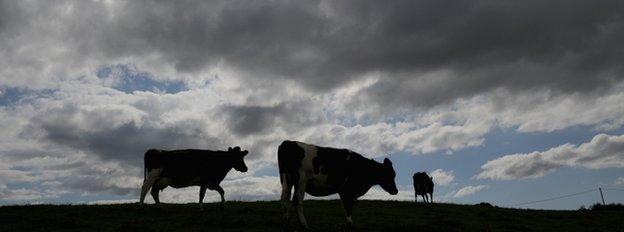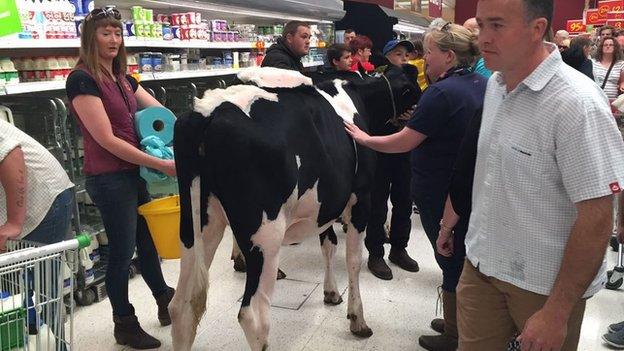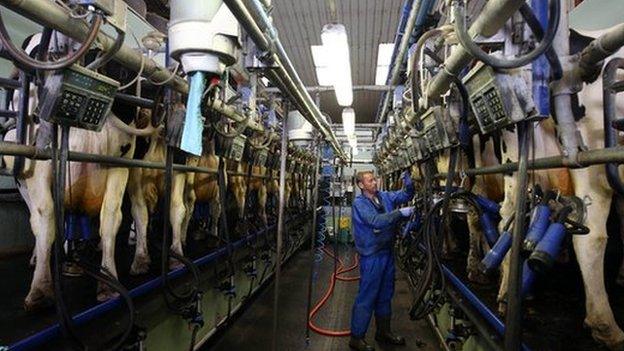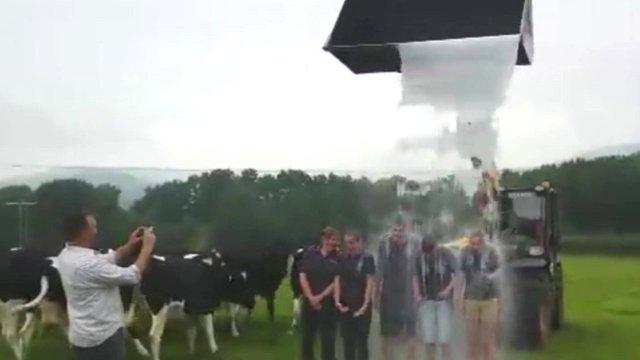Where should you buy a pint of milk to support farmers?
- Published
- comments

No-one said being an ethical dairy consumer was easy
It is a question plenty of people ask: "I want to support British dairy farmers so where should I get my milk from?"
The answer is a complicated one and it reveals some of the deeper problems everyone is grappling with in the dairy industry.
The simplest answer is buy it from the farmer.
Industry bible Farmers Weekly has an interactive map, external which shows dairy farms that also sell direct to customers. A local farm shop is also likely to sell you a good product at a price that's fair to farmers.
A traditional milkman could well be a good option, but you'll have to do your research. Many milkmen are supplied by a company called Dairy Crest, our biggest milk processor, which currently pays below what farmers claim is the cost of production. But you can find independent milkmen who pay more to farmers, companies such as Moofresh which delivers across northern Birmingham and beyond.
Supermarket choice
For many though the choice will be to use one of the major supermarket chains and when it comes to milk they're not all the same.

The milk bucket challenge, farmers having milk poured over them, has been started by young farmers in a bid to raise awareness of the low prices
Sainsbury's M&S, Tesco, Co-op and Waitrose all have farmers who supply them directly. About 10% of our dairy farmers are lucky enough to be in this position. They are eyed enviously by many of their farming neighbours.
These supermarkets guarantee to pay these farmers the cost of production and a little bit more. Surprisingly perhaps when it comes to price paid, the Co-op is actually bottom of this group.
These have been very good contracts for farmers and have allowed them to invest. Supermarkets also impose pretty stringent conditions on everything from the quality of milk to animal welfare. There are some in the industry who argue these contracts are too generous and they mean farmers have failed to improve their efficiency.
Many of these supermarkets are also looking at how much these contracts are costing them.
Chilling effect

These cows were led into a Stafford supermarket by protesting farmers
All these supermarkets still sell milk at a competitive and low price. Farmers argue this devalues milk and it certainly has a chilling effect on prices right across the industry.
You may not sell your milk to a supermarket, but whoever you do supply has to compete with them. That pushes your prices lower. So it's a bit disingenuous for these supermarkets to claim they are supporting British dairy farming. They're certainly supporting the 10% that supply them, but they're also causing problems for the rest.
There's another group of supermarkets who approach milk in a different way. Morrisons, Aldi, Asda and Lidl buy their milk from farmers' co-operatives like Arla and First Milk. These co-ops are all paying lower prices to farmers. The supermarkets argue that's not really their problem. "Mr Heinz doesn't expect me to get involved with the bean farmer" as one executive put it to me.
However, these are the supermarkets protestors have been targeting, and it appears to have worked; they've all announced they are increasing the milk price they pay.
This higher price goes through the hands of the co-op first. How much of it reaches farmers remains to be seen.
Beyond milk
Meanwhile Morrisons has launched new milk and cheese brands which cost more but all these extra money goes back to dairy farmers. The more consumers buy them the better the deal.
But of course Morrisons will actually be passing some of that money back to Arla not the farmers directly. Arla is a pan-European farming collective which means the extra cash will actually be divided amongst all their dairy farmers, both here and in the rest of Europe. That's perhaps not what Morrisons or shoppers are expecting. Meanwhile farmers would rather Morrisons took the financial hit not shoppers.
Can you support British farmers when buying other dairy products?
Well once gain it's a complex question. You'll have to consider how happy you are about the potential merger between Müller Wiseman and Dairy Crest. Will that be good or bad for farmers? Should you still buy those yogurts? Tesco may pay a sustainable price for milk but farmers say it's a different story when it comes to cheese. Which cheese should you buy?
And what about the farmers; could they be doing more to help themselves? What about that 'cost of production' figure that gets banded about so much? Figures from industry body DairyCo show there is a 14p per litre difference between the top 25% of farms and the bottom 25%. Which means the more efficient farms can still survive and even make a profit at a level that would defeat others. Should shoppers and supermarkets support less efficient farmers?
It's your choice
Farmers may be having a tough time, and many are, but despite that they've managed to produce more milk than last year. In fact it's an extra 40 pints for every person living in the UK. That is a lot of extra milk for dairies and processors to have to deal with. Is it any surprise the price has gone down?
Well no-one said being an interested ethical consumer was easy!
The truth is milk is just the start. If you want to support the British dairy industry you'll need to take a close look at the labels on butter, cheese and yogurt.
And in a broader sense think about what it is you are being asked to preserve. A traditional approach to dairy farming. We could be producing milk much more efficiently with thousands of cows inside massive sheds that never go outside. If we keep buying cheap milk that may be what we end up with.
The choices we make in the shops today could have consequences for years to come.
- Published17 August 2015

- Published17 August 2015
